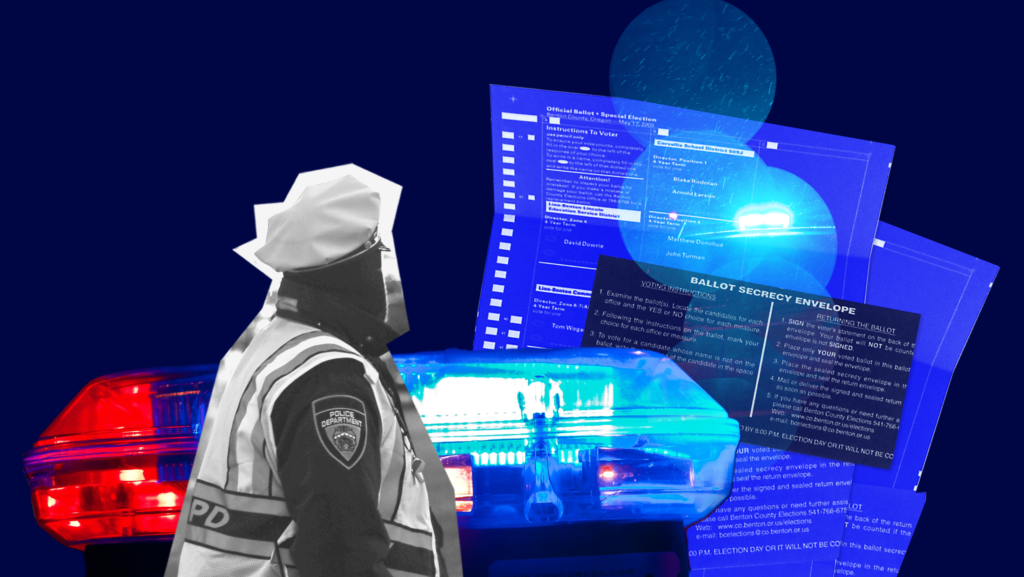Criminalizing the Voting Process

The year was 1981, amid a contested gubernatorial election in New Jersey. A vigilante police group calling themselves the National Ballot Security Task Force was patrolling the streets.
This task force was actually created by the Republican National Committee, with the goal of suppressing Black and Latino voters and swaying the outcome of the election. It was a particularly flagrant example of voter intimidation that was treated as such in subsequent lawsuits, but the concept of “election police” seems to be returning in 2022.
A recent bill in Florida has indicated a resuscitation of similar fear-mongering tactics. However, instead of outward intimidation, the latest voter suppression tactic across the country is to criminalize more and more aspects of voting and election administration processes. This means there are increased opportunities for well-meaning individuals to make mistakes, face penalties and serve as further evidence of Republicans’ manufactured “voter fraud.”
Florida is on its way to creating an election-focused law enforcement agency.
In January, Florida Gov. Ron DeSantis (R), who often postures for the sake of national politics, asked the state Legislature to create a new Office of Election Crimes and Security, a special police force to investigate election crimes. Republican lawmakers dutifully complied, passing Senate Bill 524 in mid-March. Among a host of other measures, S.B. 524 creates the unnecessary agency DeSantis requested.
The new force will help the Florida secretary of state investigate allegations of fraud, conduct its own independent investigations and monitor a voter fraud hotline. S.B. 524 gives DeSantis, who has yet to sign the bill into law, the extraordinary authority of appointing the officers and specifying their powers.
Georgia was quick to follow suit. The Georgia House recently passed House Bill 1464, a bill that would have similarly empowered the Georgia Bureau of Investigation (GBI) to investigate election crimes. Luckily, H.B. 1464 was gutted by a Senate committee that cut the state House version of the bill from 40 pages to two, removing the GBI provision and other harmful requirements.
The overwhelming concern is that partisan agencies will be used to intimidate election officials, civic engagement organizations and voters, especially in historically marginalized communities. In submitted testimony to the Florida Senate, the NAACP Legal Defense Fund chronicled the long history of law enforcement intimidating Black voters in the state.
New laws are criminalizing harmless voting and election activities.
The Florida bill does more than just create a new agency. S.B. 524 makes it a felony to return more than two completed ballots (often collected by friends, family or nonprofits on behalf of those who cannot easily return their ballots) and dramatically increases fines for civic engagement organizations that make mistakes on registration forms or mail-in ballot applications.
It is already a crime to commit voter fraud, electioneering or any other inherently wrong election misconduct. That’s obvious. But now, in red states across the country, it is a civil or criminal offense to conduct much of the benign, but often important, work surrounding voting. These new laws target election officials and third-party voter registration organizations that want to encourage more people to vote. Here are a few examples:
- Since 1990, Iowa has allowed any voter to vote by mail. To boost turnout, some county auditors proactively sent mail-in ballot applications to their residents. In light of a 2021 law, Iowan county auditors are prohibited from sending out mail-in ballot applications and pre-filling certain information on the forms. They face new fines for the decades-long practice of encouraging their residents to vote.
- With long lines winding around a polling place in Atlanta, a volunteer wants to hand voters snacks and water to make the wait more bearable. In Georgia, as well as Florida and elsewhere, this is a misdemeanor offense.
- A person working with a get out the vote organization on the Blackfeet Indian Reservation — an area the size of Delaware that only had two election offices and four ballot drop-off locations in 2020 — wants to collect and drop off ballots. However, in Montana, it’s illegal to receive any “pecuniary benefit” (financial compensation) from ballot collection efforts. Montana has a history of targeting community ballot collection, a safe practice that is especially useful for geographically isolated Native American communities.
- During the recent March primaries in Texas, it was unclear whether paid aides would face steep penalties for assisting Texans with disabilities in the voting booth.
When something is criminalized, people are dissuaded from engaging in adjacent activity.
In the voting context, more penalties can have a suppressive effect on lawful behavior. In the courts, civil and voting rights organizations have challenged some of these laws under the First Amendment for violating an organization or individual’s protected political speech.
The real or perceived threat of fines and criminal prosecution can have a devastating impact on turnout. “Does the Legislature care about the other message it’s sending, by increasing penalties for what could be accidental violations of law, and creating new types of election crimes — and then creating a new law enforcement bureaucracy to investigate them?” wrote Common Cause in a statement on Florida’s S.B. 524. “No voter should have to factor the likelihood of getting investigated into their calculation of whether and how to vote.”
Nonprofit organizations and election officials are a cornerstone of democracy, often working hard to encourage more voters to take part in the political process. It should ring every alarm bell that lawmakers are penalizing efforts to achieve a more engaged and representative electorate. But, that’s the very point of it all.